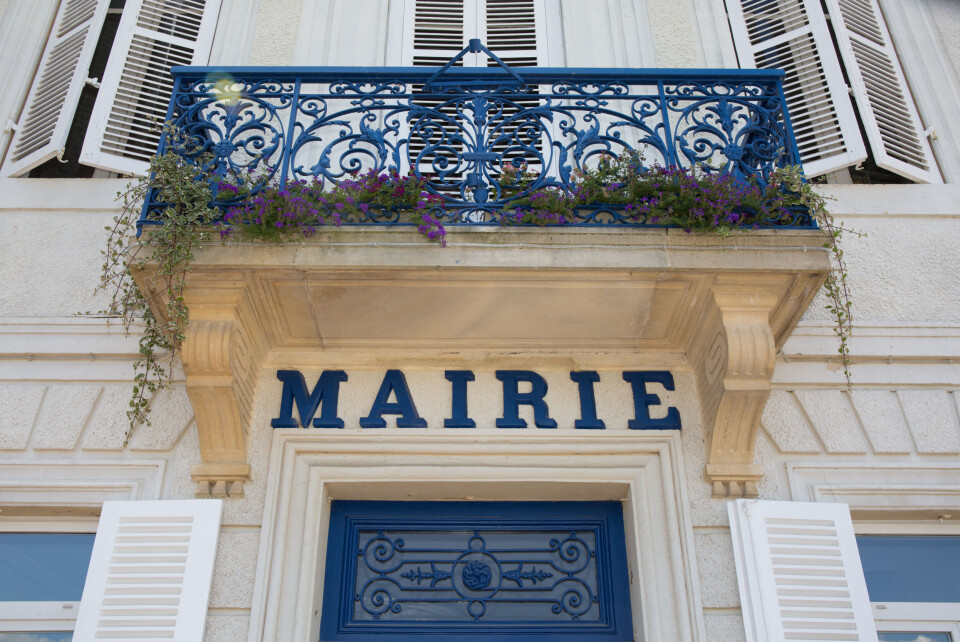-
Local election rule changes in France and why you may have a new mayor in 2026
Communes with fewer than 1,000 residents are particularly set to see changes from next year
-
Most people are happy with their French mayor, new poll shows
It comes as mayors themselves say their job is getting tougher
-
New scam over household bins in France: how to avoid being caught out
The scam relates to your council-issued bin
12 things you can do at your mairie in France apart from get married
We highlight fun and serious ways the local mairie keeps your French community running smoothly

There are around 35,000 communes in France, almost all of them with a mairie.
You can only legally get married at a mairie, although you can have a marriage blessed in church (or anywhere else for that matter).
You can also get a civil partnership here, known in France as a pacte civil de solidarité (pacs).
Formal recognition of relationships is not, however, the only service that mairies offer. They are the first port of call for numerous queries and bureaucratic functions.
The services they manage depend on the size of the commune and the areas of responsibility delegated by the local communauté de communes.
Read more: 15 things your French ‘com com’ can do apart from collect your bins
These can include town planning, housing, schools, public sporting equipment, cultural activities, health and social aid, and even, in theory, the police.
Essentially, whatever your query, if the mairie cannot answer it, the team there will at least point you in the right direction. Here are other services offered:
1. Apply for planning permission
A declaration of works on a property (déclaration préalable) or application for full planning permission must be submitted to the mairie.
You can also contest someone else’s application and consult the local planning rules (plan local d’urbanisme).
Read more: Next door’s extension will block sun to my French home. What can I do?
2. Get an updated birth certificate
In France, you must apply to the town hall where you were born (rather than the local mairie) for a current birth certificate.
These are updated each time something happens: a name change, marriage, divorce, children, death.
This is why ‘officialdom’ requires a recent (no more than three months old) copy of a birth certificate.
3. Apply for a tip permit
Proof of address (un justificatif de domicile) or a special card from your mairie is generally required to access the local déchetterie.
They can also tell you where the nearest tipping facility is.
Read more: How to get a déchetterie permit in France with a UK-registered car
4. Get on the electoral list
This applies to EU citizens only. Pre-Brexit, UK citizens could vote in local and European elections, but this is no longer the case.
5. Celebrate high days and holidays
A great aspect of French life is the custom in many communes of inviting residents to free apéros on bank holidays.
Apart from being able to chat to the élus (elected officials), it is also a useful way to meet the neighbours. Some mairies arrange drinks for new arrivals too.
6. Do recensement citoyen paperwork
At age 16, French citizens complete a recensement citoyen declaration (sometimes erroneously called a military census) in order to get an attestation de recensement.
This involves completing a journée défense et citoyenneté (JDC) and is essential to sit exams including the Bac and BEP, to enter a concours administratif (competitive hiring/training exams within the civil service), to be added to the electoral roll at 18, or to get a driving licence.
7. Ask permission for school enrolment
In theory, children should go to the school in their commune, so if you want to send them somewhere else, you usually have to ask permission (dérogation scolaire).
8. Arrange a civil baptism
If you are not religious but would still like to welcome a new baby with a ceremony, you can ask the maire for a civil baptism. The ceremony is free.
The maire is not legally obliged to perform it but it is rare for a request to be refused. If it is refused, parents can ask at another mairie.
9. Find local tradespeople
Most mairies have a website detailing local businesses, many of which have no other online presence, making this a fabulous way of finding local tradespeople.
Read more: How can I find a reliable electrician in France?
10. Declare your gîte or chambre d’hôtes
Whether you rent out a room on Airbnb or run a full-blown holiday accommodation business, you must declare it at the mairie.
11. Register a death
To register a death, you must go to the mairie in the commune where the death occurred, regardless of the nationality of the deceased.
Bring your ID and, if possible, the death certificate, plus any document concerning the identity of the deceased. You should also register the death of large animals, such as horses.
12. Seek mediation with noisy neighbours
If you cannot agree with neighbours about loud music, your plum tree’s branches or a barking dog, the maire will often intervene to settle the matter, or at least to point out the local regulations.
Related articles
Hundreds of French mayors quit due to ‘Covid and increased workload’
What can you do in France if your neighbour’s children are too noisy?
Ten things you can do at French prefectures beyond carte de séjours
























